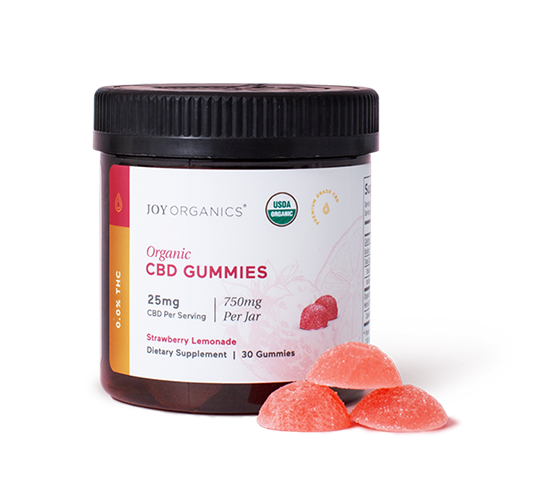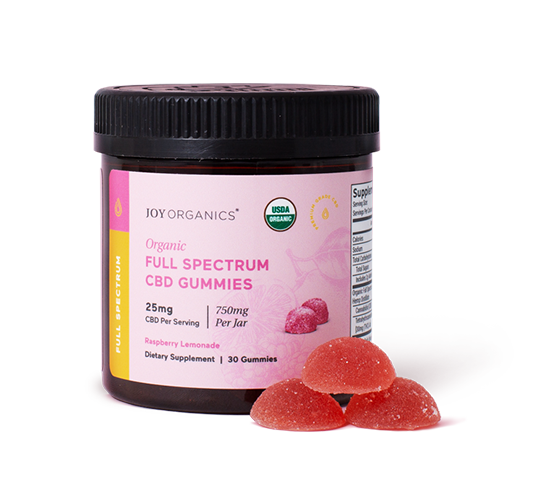What Is CBD?
We'd like to introduce you to cannabidiol (or CBD, for short). You'll find this compound in hemp plant-based products, like our CBD gummies. CBD's claim to fame is the way it benefits the mind and body. Many people incorporate it into their routines to promote balance, rest, and achieve their wellness goals.
How does CBD work?
CBD interacts with the body via the endocannabinoid system. This system impacts many of your body's functions, including sleep regulation and mood. This system is made up of signaling compounds produced by the body and receptors found on the surface of your body's cells.
CBD provides the body with cannabinoids. These compounds are very similar to the signaling molecules your body produces and are processed by your liver as part of your body’s natural system. They are also the reason CBD can have an impact on your health and well-being. By interacting with your body's endocannabinoid system, CBD helps you find balance and a state of homeostasis. Benefits like better sleep and relaxation tend to follow from this interaction.
Cannabis contains a huge variety of cannabinoids. Each of these molecules interact with your body in different ways. For example, CBD is a cannabinoid that impacts your body's "feel-good" hormone, serotonin. You may have heard of THC, the compound in marijuana that provides a euphoric "high." Cannabinol (CBN) can help you get a good night's rest.
Because different cannabinoids impact the body in different ways, you can use them to get the specific results you want, depending on your body and wellness conditions. For example, our sleep support gummies use a higher concentration of cannabinol. Our full spectrum CBD gummies contain all of the naturally occurring cannabinoids and terpenes found in cannabis, while broad spectrum means CBD gummies that are THC-free.
Each cannabinoid on its own is good, but when you put them together? That's when the magic happens. Known as the entourage effect, the different compounds present in hemp can work together to create effects greater than what they can do individually. Full spectrum CBD gummies (those that contain a small amount of THC) take advantage of this effect.
There are so many ways that cannabinoids can impact the body, which is why Joy Organics has such a range of products designed to help you reach your full potential for wellness. We want you to be able to find a product that works best for you. Shop around, research and learn more about what CBD can do for you, and enjoy a happier, healthier life.

Which CBD Gummy Is Right for You?
Feeling a little overwhelmed by all the different CBD gummies in our shop? That's okay. There's a lot of information to take in. Here's a quick primer on the CBD gummies we offer and how they can impact your health and life.
Our full spectrum CBD gummies contain 25 mg of CBD and 1 mg of Delta-9 THC per gummy. They are considered the best option for people who want to experience the entourage effect without any psychoactive effects. In other words, you'll get all the good stuff without the high.
Not everyone wants THC in their CBD gummies, and we're happy to support that. Our broad spectrum CBD gummies are available in 10 mg and 25 mg concentrations and have no detectable THC. While they won't provide the additional benefits of the entourage effect, you'll still get all the mood and sleep impacts that CBD provides.
CBD Sleep Gummies
We crafted these CBD infused gummies to help you find a great night's sleep. Each serving has 30 mg of CBD, 3 mg of sleep-supporting CBN, 3 mg of melatonin, and 1 mg of THC. Put together, these ingredients help you fall asleep easily and wake up without the grogginess you'll get from other types of sleep support.
Organic Broad Spectrum Gummies
High-THC Gummies
Our Delta 9 high-THC gummies feature our hemp-derived THC. These legal CBD gummies help you find that bliss you're looking for, while also giving you the mood and sleep support of CBD. Our high-THC gummies are available in different concentrations, so you can find the right amount for your body and lifestyle, depending on your needs.
The Best CBD Gummies for Every Lifestyle
No two lifestyles are the same, but there's still a gummy for every one of them.
- Active: Incorporate CBD gummies to help promote overall wellness. Whether you're on the go for work or enjoying your favorite sport, our CBD-infused gummies have your back, helping you stay in a great position to feel your best. We've designed them with ease and flexibility in mind, so they’re a wise choice for your wellness routine. Enjoy wherever, whenever, and however you need them.
- Stressed Out: We've all been there. Our gummies help you find calm whenever life feels overwhelming. With many strengths and formulations available, you can find the calm you need when and where you need it.
- Focused: When it's time to buckle down and get things done, it's time to reach for a CBD product. Our customers love the way they help manage their moods and feelings without causing them to lose focus. Forget the distractions dragging you down: enjoy a little tranquility and lock in on what's important to you.
- At Peace: A good day starts with a great night's sleep. Set yourself up for success by unwinding with CBD Sleep Gummies before bed. They'll help you say "goodbye" to the cares of the day and "hello" to the type of sleep you deserve. Wake up refreshed in the morning, not groggy, and see the difference nighttime CBD gummies can make.
- Doing it All: When you're balancing life's demands, it can sometimes feel impossible to find a moment for yourself. Whether you're a caretaker, a busy parent, or immersed in your work, you deserve a chance to let go of stress and unwind. CBD gummies will help you do just that, all while supporting your overall health.
- Seeking Comfort: CBD supports overall wellness, including active lifestyles and recovery routines. If you’re looking for a little more comfort in your day, adding a CBD gummy to your wellness routine can be a simple way to support balance and ease.
Taste the Difference (Flavor Options)
Think CBD tastes too "earthy" to be enjoyable? Think again. We've obsessed over our gummy flavors, refining them until they're nothing but "yum." Try these on for size:
- Strawberry Lemonade: You'll find our strawberry lemonade flavor in our broad spectrum CBD gummies. Light and refreshing, it'll have you thinking of sitting on the front porch in summertime.
- Raspberry Lemonade: These gummies are made with full spectrum CBD oil. They'll help you feel as calm, cool, and collected as a tall glass of ice cold raspberry lemonade.
- Blackberry Lime: A little bit sour, a little bit sweet, and a whole lot of "ahhhhh." Our blackberry lime gummies are the perfect end to a long day.
- Cherry Lime: Gummies should be fun. That's why we love the combination of cherry and lime. Bright, tasty, and just the right vibe for our high-THC gummies.
- Beach Flavors: You can't always kick back on the beach when you want to, but our gummies will get you close. Tropically flavored, our orange, pineapple, and blueberry lemonade gummies will have you feeling like a day at the beach.
- Nighttime Berry: Ready to get cozy? Our Sleep Gummies are a perfectly sweet way to end your day.
How to Get the Most Out of Your CBD Gummies
Everybody's body is different, which means your experience with CBD may be different from somebody else's. One of the benefits of CBD gummies is that they're easy to cut in half to change your serving size to determine your ideal tolerance.
If you're new to CBD, or if you want to get more out of it, we recommend starting small and taking half a gummy. Wait an hour to see how you feel. If you're looking for greater CBD effects, try a full gummy next time. Adjust how many CBD gummies you eat bit by bit until you have the mood and sleep support impacts you're looking for, and gradually increase your serving if needed. Start low and go slow.
Pure, Simple, and Lab-Tested CBD Gummies for Your Peace of Mind
We want you to be confident in what you put in your body. That’s why quality and transparency are our top goals. Everything we make undergoes rigorous third-party testing to ensure your safety, and every test is made available online for you to check for yourself. You can be confident that the CBD-infused gummies you receive have been thoroughly tested for potency and purity.
Our CBD edibles use simple, clean formulas: no corn syrup, no artificial sweeteners, and no fillers. They're also vegan and gluten-free, crafted to be gentle on the stomach and mindful of healthy digestion. We only use premium ingredients because we know our customers care about what they consume. Our CBD edibles are crafted with an eye for quality and made with the highest-grade ingredients we can find.
Bundles and Value Packs
- Bundle and Save! Not ready to subscribe but still want savings? We’ve got you. Select one of our high-quality CBD gummy bundles and save 20% over their individual price. It’s a great way to get the savings of our subscription program without needing to subscribe.
- Stock Up! Opting for one of our gummy bundles helps you keep your favorite CBD products on hand. No need for that moment of dread when you realize your jar is empty - you’ll have another one right on deck.
- Give the Gift of Calm: Our bundles are a great choice for gifting. Keep one for yourself, and give one to someone in your life who could use the benefits of CBD. Gummies make a great gift during the holidays, or for birthdays, special occasions, or any other time of year.
- Find Your New Favorite: Not sure which gummy you want to subscribe to? Our mixed product bundles are a great way to save while trying something new. You’ll get 20% off the value of both CBD products, while getting to experience a greater variety of flavors and potencies.
If you've been curious about the difference that high-quality CBD can make in your life, there's no better time than now to buy CBD gummies online and get started. Whether your goal is better sleep, a happier mood, a more comfortable body, or just a greater sense of overall wellness, Joy Organic's CBD gummies may help. If you're a seasoned CBD pro, you'll be impressed by how our commitment to quality and transparency leads to an incredible product. Jump in and see how CBD may improve your life today!
Disclaimer: These statements have not been evaluated by the Food and Drug Administration. This product is not intended to diagnose, treat, cure, or prevent any disease.











































